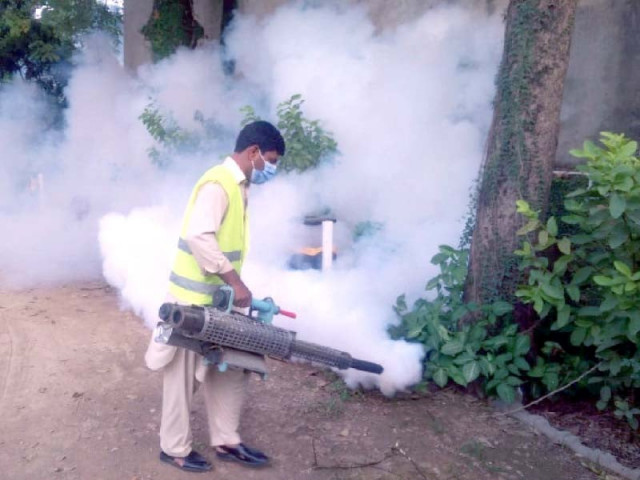Dengue’s upsurge worries residents
Lack of hospital beds, no proper spraying top the list of concerns

Triggered by puddles of water left behind by the monsoon spell, dengue has reared its ugly head in Peshawar again and residents fear that a mosquito borne viral disease emergency is on the cards now. According to a Integrated Disease Surveillance and Response System K-P report, around 190 cases of dengue were reported in the province in the last week alone, out of which 62 were from the provincial capital.
The upsurge has made Peshawar’s residents anxious that a dengue emergency similar to the one they experienced in the winter season last year might take them hostage again. Sadat Shah, a resident of the Palosai area, whose family was recently infected with dengue, opined that the government remained inactive as the disease was on the verge of causing chaos.
“Our neighbourhood has registered many complaints with the relevant officials urging them to spray against the mosquitoes but no one has shown any concern,” Shah informed this reporter, adding that like always the local administration would only take action once all hell breaks loose.
A resident of the Tehkal area, Shadab Khan, concurring with Shah’s views, said that despite their vicinity being the worst affected of past dengue seasons, officials were yet to show up to spray the larvae.
“We fear that the flood and monsoon will only exacerbate the spread of the disease but apparently the government does not share these fears,” Khan lamented. He further said that despite the rise in cases, there was a lack of beds in Peshawar’s hospitals which would only make matters worse. Spokesman for the Lady Reading Hospital, Muhammad Asim, when asked about the low bed count given the upsurge in dengue cases, said that the hospital had dedicated a 15 bed isolation ward for patients of the mosquito borne viral disease.
“We are assessing the situation and if the number of patients increases then we will increase our bed occupancy from 15 beds to 30 beds,” said Asim. Muhammad Sajjad Khan, Spokesperson for Khyber Teaching Hospital (KTH), was also asked about the low bed count, to which he replied that KTH had set aside 20 beds for dengue patients.
The KTH spokesperson further said that the hospital was ready for any kind of emergency situation. Even though the hospital expressed optimism in their preparedness, The Express Tribune asked Dr Qasim Afridi, Coordinator of the provincial Malaria and Dengue Control Programme, what the province was doing to combat the spread and he replied that multiple steps are being taken.
“We realise that the cases are rising every day and we are doing our utmost to contain the spread,” Afridi said, adding that they were identifying problem areas and would then spray dengue larvae. He further said that in the past few weeks thousands of sites have already been visited and sprayed.
“Moreover, we have issued directions to all concerned departments to do their utmost to control dengue in flood hit areas. However, the people should also create awareness among their neighbourhoods to successfully combat the viral disease,” Afridi told The Express Tribune.
Published in The Express Tribune, August 17th, 2022.



















COMMENTS
Comments are moderated and generally will be posted if they are on-topic and not abusive.
For more information, please see our Comments FAQ